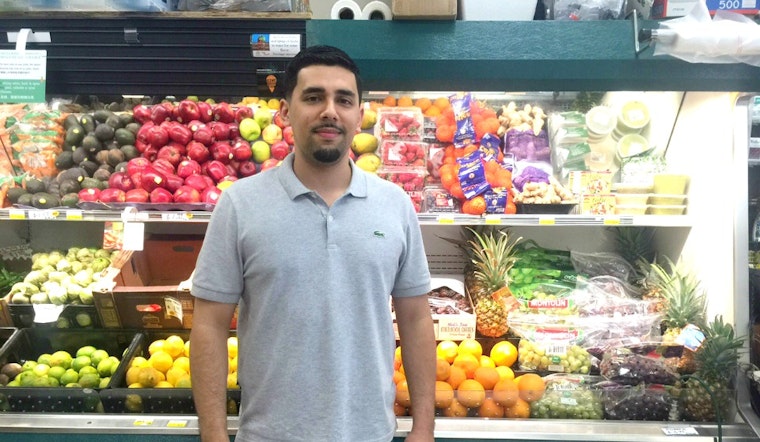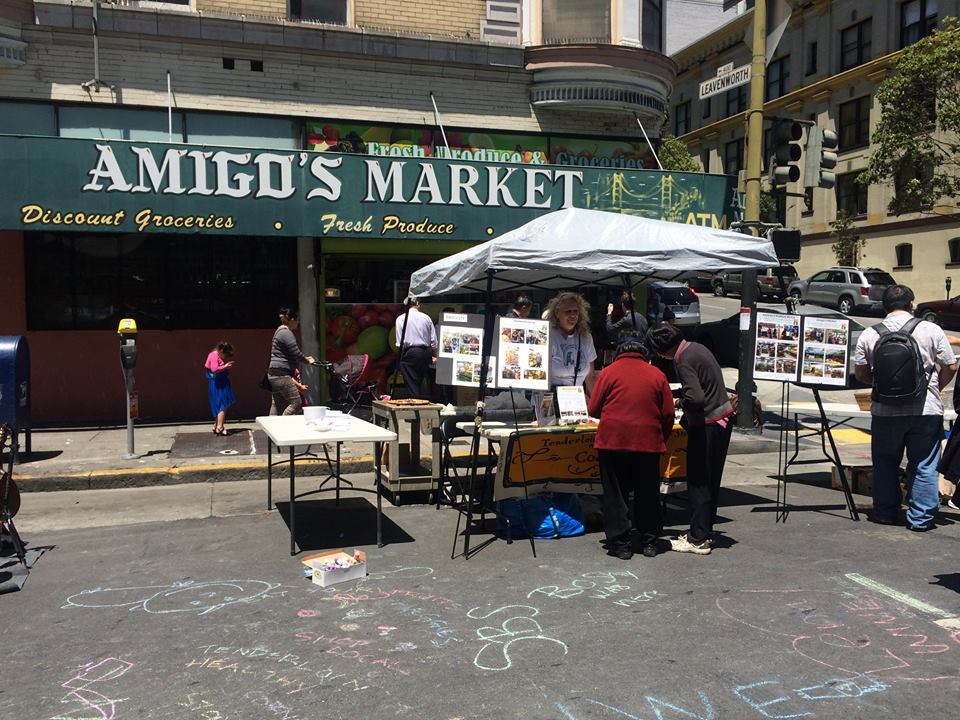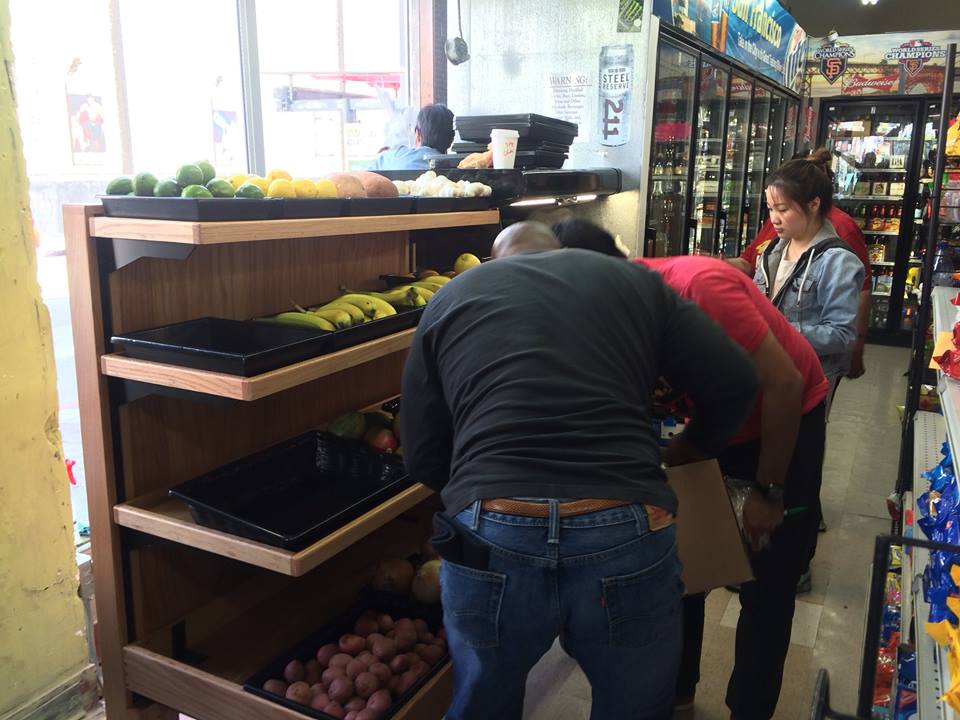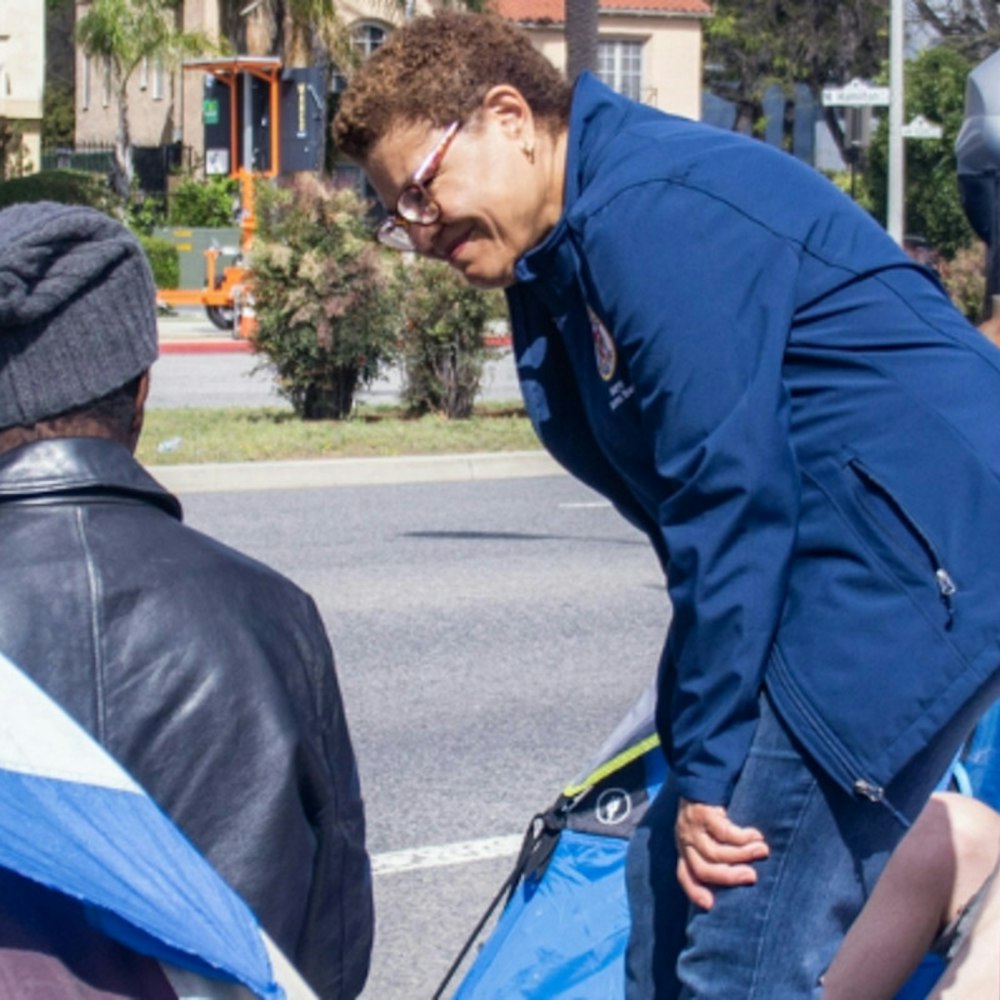
This article, written by Marjorie Beggs, was originally published in Central City Extra's November 2016 issue (pdf). You can find the newspaper distributed around area cafes, nonprofits, City Hall offices, SROs and other residences—and in the periodicals section on the fifth floor of the Main Library.
The Tenderloin is slowly embracing a healthier marketplace—the corner stores where residents shop for snacks and many for meals.
The city’s two-year-old Healthy Retail SF program now supports nine stores, five in the TL, in their move away from heavy merchandizing of cigarettes, alcohol and high-calorie, no-nutrition nibbles and toward real food—brightly colored, fresh produce, whole-grain products and more, arrayed appealingly on modern shelving at the front of each store.
Fresh produce is definitely catching on, according to a program report released Oct. 28th. Each of the nine stores is selling an average of 1,615 more produce items per month than before its healthy makeover. That means neighborhood shoppers are getting more fresh food and store owners are benefiting, too: They’ve increased their overall sales by an average $5,000-plus, a jump of 25 percent.
More good news: The Healthy Retail SF program aims to get participating mom-n-pops to give more display space to nutritious food and less to tobacco and alcohol. The numbers won’t be in for a year, but the report says that’s already happening big time.
“This is a program that grew from the ground up and is showing the positive, collective impact of community members, nonprofits and city agencies working together,” says Jessica Estrada, DPH community engagement coordinator for Healthy Retail SF.

The good food transformation began officially three years ago with Supervisor Eric Mar’s legislation encouraging stores in “food desert” neighborhoods like the Tenderloin to make the shift by offering them incentives: help learning how to make a profit selling healthy food, store redesign to enhance product appeal, and grants and loans for façade improvement and equipment, all worth about $15,000 to $20,000 per store.
In exchange, store owners sign a three-year agreement to work toward converting their space so at least 35 percent of their floor and shelf area is devoted to fresh produce, whole grains, lean proteins and low-fat dairy products, and no more than 20 percent to tobacco and alcohol products.
Operated through the Office of Economic and Workforce Development, the program has a modest $60,000 annual budget drawn from the city’s general fund. That pays for new stores that come into the fold, ongoing expenses of participants and some of the work of the neighborhood groups that recruit and support the stores, help coordinate their makeovers, monitor their progress with “report cards,” and promote the benefits of shopping at the model stores to fellow residents.

The revenue is secure for this fiscal year, says OEWD spokeswoman Gloria Chan, and OEWD “will continue to monitor and evaluate the program with DPH and our community partners and work together to figure out next steps.”
The latest corner store in the Tenderloin to join the program is owner Alam Virk's Fox Market at 570 Larkin St., which reopened officially today, Radman’s, at 201 Turk St., was the first TL healthy corner store, in 2014, followed by Dalda’s at 200 Eddy St., Amigo’s at 500 Ellis St. and Mid-City at 868 Geary all in 2015. Bayview, site of the city’s first Healthy Retail SF store, now has three in the program and OMI (Ocean View/Merced Heights/Ingleside) has one.
Stores in the program don’t close during the months leading up to re-openings—this time is called a “reset”—but a cadre of city and community helpers is needed to convert stores and ensure that the unveiling of the makeover runs smoothly.
Tenderloin Healthy Corner Store Coalition and its “food justice leaders” are the great story behind this successful effort to improve a neighborhood. Formed in 2012 to urge passage of Healthy Retail SF, the coalition drew members from TNDC and other nonprofits and from city agencies like DPH’s Tobacco Free Project and the Feeling Good nutrition program.

Another nonprofit had already set
the stage. In 2011, young people from the
Vietnamese Youth Development Center,
a member of the Tobacco Free Coalition,
began mapping the number of TL corner
stores and assessing the quality of their
offerings, an effort that grew from their
Let’s Stop Tobacco project. The youth
mapped 46 TL tobacco outlets, checking
to see if they were complying with city
regulations about posting retail tobacco
licenses and limiting tobacco and alcohol
advertising to no more than a third of
a storefront. They also tallied each store’s
fresh fruit and vegetable offerings.
When the Tenderloin Healthy CornerStore Coalition formed, VietnameseYouth Development Center joined and became an invaluable resource. It got a $30,000 grant from the San Francisco Foundation and $25,000 from Dignity Health to survey residents, assess corner stores and transform the first store as a pilot project.
“It’s been amazing to see how the program took off from there and evolved, one store at a time,” says Estrada, who formerly was VYDC youth advocacy coordinator. “The store owners are a unique population—they’re part of the community, but you have to meet them where they’re at, get their buy-in, show them the benefits.”
The coalition, she says, adds “people power,” food justice leaders working in the neighborhood doing customer surveys, store assessments, store tours, community and media events, reset activities like stocking shelves, and outreach to shoppers. Success also depends on those shoppers, the residents themselves, spreading the word that drives others to patronize the stores.
The coalition meets monthly and hosts an annual community gathering. That Sept. 29th event at Boeddeker Park drew 350 people who sampled tasty, nutritional foods—pureed yams, sliced red peppers, zucchini salad—learned about other health resources from 23 organizations such as CalFresh and Heart of the City Farmers Market, and met owners of the five corner stores leading the way in the Tenderloin.

The coalition also has produced
three annual shopping guides. Food
justice leaders visit stores in the hood,
then rank them according to types and
quality of food sold, product placement,
cleanliness and safety, amount and type
of advertisements, and fair labor. The
last guide, published in 2015, surveyed
more than 50 of the TL’s 70 corner stores
(some decline to participate), with the
best getting four stars.
One of those was Radman’s, whose “healthy highlights” included low-fat and lactose-free milk, fresh eggs, whole-grain bread, whole-grain and corn tortillas, fresh and frozen fruit and vegetables, and fresh and frozen meats and poultry.
A new guide will be out next year, says Ryan Thayer, TNDC community organizer and coalition co-coordinator with Lisa Juachon, and the group expects the good news to continue: Over the last three years, stores getting three or four stars rose from 13 to 30 as the lesser-stars stores fell from 43 to 25.
Such shifts suggest that even store owners outside the program understand that selling good food can be profitable and are changing on their own.
“This is a good business model,” Thayer says.
Also in 2017, he says, each of the nine participating stores citywide will get a $1,500 “incentive” to stay the course by spending it on physical improvements, technical assistance or advertising. A 10th store will be added. And, in the TL, the coalition will help Dalda’s move to a second phase of conversion that includes enlarging the produce section and reorganizing shelving.









